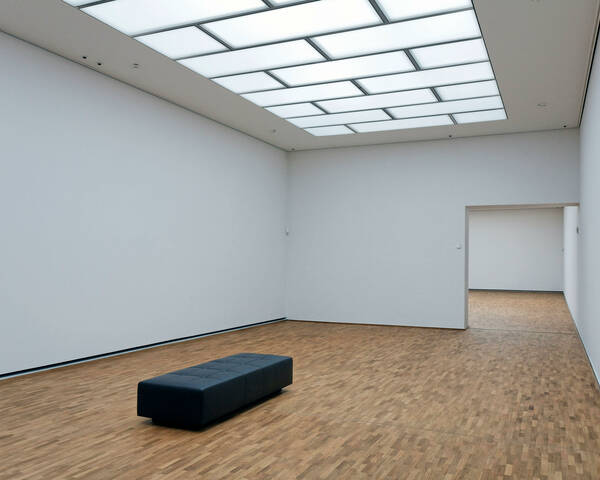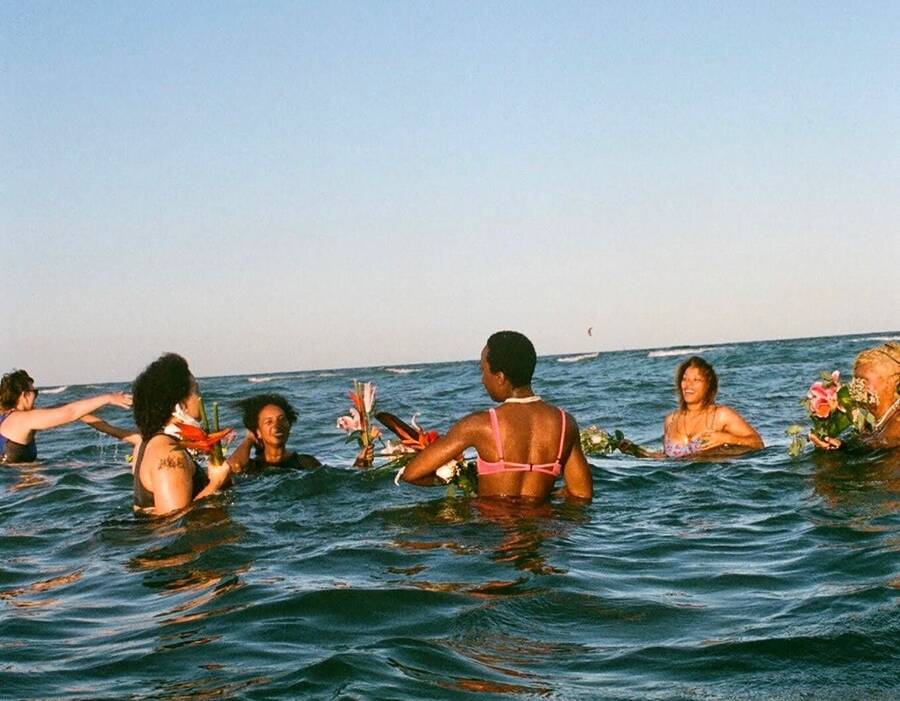
Third World Feminism School's climate optimism ritual, Miami, March 2023
Rose Alexis“Our North Is the South”
An experiment in radical education
It was Miami in the early 2020s, and we were self-medicating with somatics and shrooms, though we knew what was really making us sick was capitalism. In one of the country’s most expensive cities, our pleasures were often free: spontaneous trips to the beach, bags of mangos gifted by neighbors, bottles of natural wine offered on the house by the owners of Paradis Books & Bread, a refuge for Miami’s embattled artists and organizers. We wore our queerness and our immigrant origins like armor (even, and especially, if we had never been to the home countries of our parents), and at a Black queer party called Masisi, we thrummed with common purpose, like a hive. Everyone was a self-described cultural worker—poets and crocheters and illustrators and dancers—and as a result of skill or luck or beauty, we sometimes found ourselves in luxury hotels on South Beach, invite-only Art Basel parties, Vogue runway shows. There were fundraisers for top surgeries and solidarity trips to Cuba and unwarranted evictions. We lived with our parents or in overpriced apartments riddled with termites or crumbling with mold but oh! the windows. All you had to do was look outside and a single riotous pink bougainvillea could make you feel like the luckiest person alive.
We felt Miami’s surreal juxtapositions in our bodies. White people in other parts of the country touted statistics about Cuban Americans on Obamacare who voted for Trump; we knew them because they were our neighbors, our colleagues, and, for some of us, our families. In Miami, a toxic Latinidad obscures vast inequalities: Racism cannot exist, the logic goes, because Spanish is spoken everywhere and everyone has an alleged Black grandmother. But proximity between Latin American and Caribbean diasporas does not naturally coalesce into a unified front against the imperialism that drove many from their countries of origin. Beautiful and Black and brown and queer and trans as we were, we might have fallen back on the promise of coolness—“an empty language,” my friend Helen, a Miami-born filmmaker, called the trendy multiculturalism they noticed upon returning to the city after college in 2016. We could have assumed that simply being next to one another was enough. But we knew better. There was power in our presence here, and we wanted to honor our decimated and displaced peoples by building something amid the ruins of our histories. We were committed to turning proximity into solidarity, so in 2023 we all got together and started ourselves a school.
Third World Feminist School was founded by four Miami-based cultural workers: I am an Afro-Caribbean scholar, Bobuq is an Afghan writer, Helen is a Dominican filmmaker, and Zaina is a Palestinian poet and organizer. We took inspiration from US-based Third World feminists of the 1970s and ’80s—collectives like the Third World Women’s Alliance, and publications like This Bridge Called My Back—who committed to explicitly internationalist, anti-imperialist, and anti-capitalist principles as they organized marginalized peoples in the heart of empire. We received a onetime $100,000 pandemic recovery grant from the American Council of Learned Societies and we spent it with a joyriding giddiness, working-class people at last given free rein to treat their friends. Notebooks! Dinner provided! Film licensing fees! And, best of all, a $1,000 stipend for each of our 25 students—a consequential amount for the financially precarious group. In offering members the material support that made it possible to devote their time to intellectual and artistic pursuits, we felt ourselves draw closer to the injunction of Black feminist writer Toni Cade Bambara: “to make revolution irresistible.”
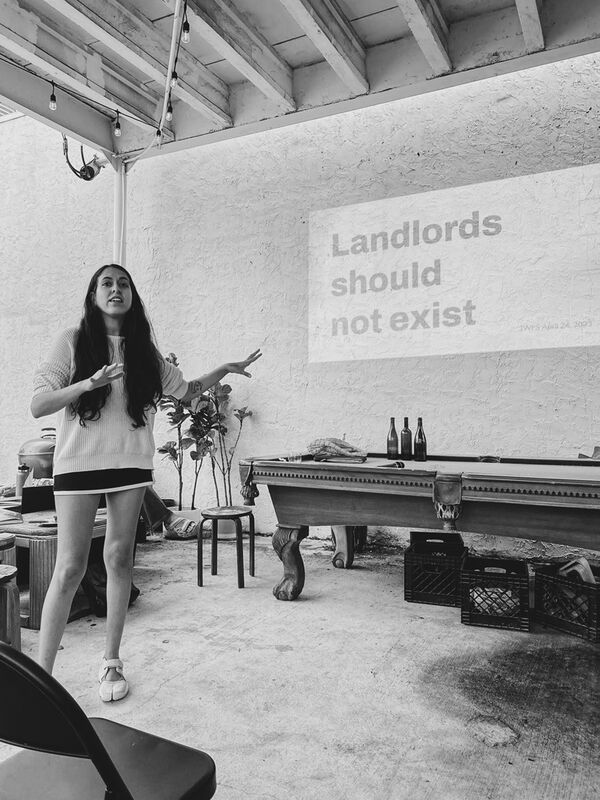
Lesson on tenant organizing, May 2023.
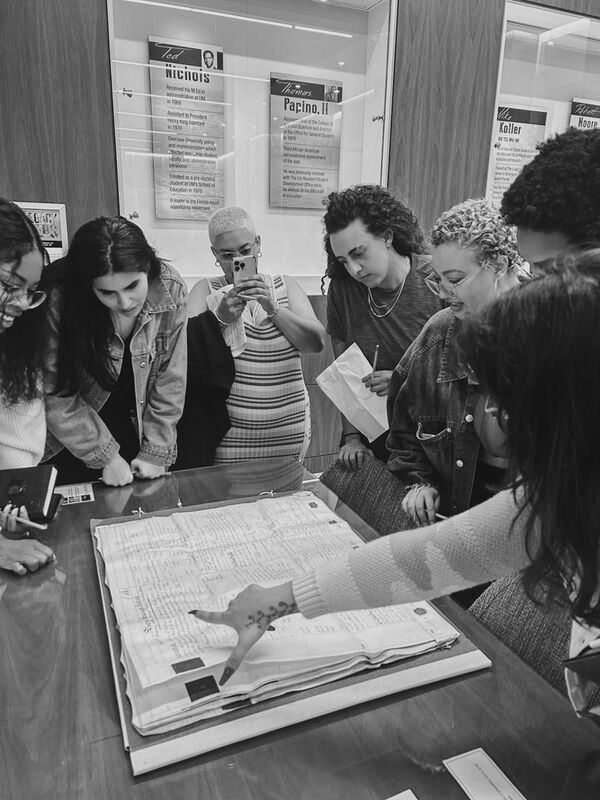
Visit to the Kislak Center Archives at the University of Miami, February 2023.
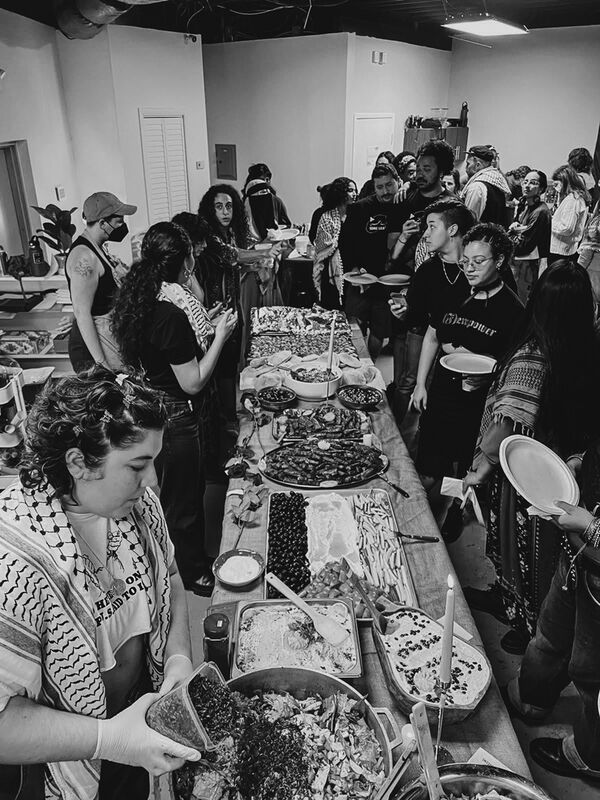
Right: Dinner at Palestine Film Day, December 2023.
The goal of Third World Feminist School was not just education, but convocation. On the first day of class, one of our students said, “The people are the wealth of this space.” We shared histories of organizing against capitalism and empire from our own cultural contexts: Caribbean surrealist writers resisting fascist dictatorships, African American hospital workers striking in Charleston in 1969, agricultural and domestic workers in South Florida currently fighting for protections on the job. “Class” felt like too narrow a term for our gatherings, which sometimes brought us to the ocean for climate optimism rituals, to local theaters for film screenings, and to archives for explorations of our regional history. Usually, we projected PowerPoints—about subjects from landless workers’ movements to pinkwashing—onto the outdoor wall of Paradis. Occasionally, a tiny lizard would scamper across our presentations. Each session officially lasted two hours, but we often stayed much longer, talking under the banana leaves and letting the information soak like shea butter into our skin. In one of our first lessons, Zaina shared a drawing by the Uruguayan artist Joaquín Torres-García, depicting an inverted view of South America. “Nuestro Norte es el Sur,” he writes. Our North is the South. The provocation struck me. What if we saw Miami as our North? What if, rather than pitying us, American leftists looked south for their strategy? Nasim, a Palestinian wildlife biologist and Third World Feminist School student, tells me that their family history of struggle binds them to Miami, where they’ve chosen to make a home: “Sometimes I’m asked, ‘Why here?’ Why fight for this landscape and ecosystem, when in other places my efforts would be more fruitful? But the fight is everywhere—and when I think of where my ancestors have been, I recall that we’ve always fought our battles uphill.”
If the fight is everywhere, so is the resistance. Resistance is the dancer teaching us the sacred Haitian dance of Yanvalou after class. Resistance is the domestic worker who comes to speak with us about her experience organizing a largely undocumented workforce under the shadow of a 2023 state law criminalizing the transport of undocumented people, and says, “Lo que hago yo hago sin miedo.” What I do, I do without fear. Resistance is the tenants chanting in Spanish and Haitian Creole. And resistance is all of us, gathering to learn the histories of our power in a state that has rendered that knowledge contraband. Nasim attributes some of these lessons to the land itself. “Water is pure resistance,” they say, describing the torrential rain that periodically floods low-lying affluent neighborhoods like Brickell and South Beach. In Miami, the rich are now reaping the consequences of the redlining practices that designated the higher-elevation areas as Black neighborhoods. Local writers and researchers like Nadege Green have sounded the alarm about climate gentrification as properties in places like Liberty City and Little Haiti are bought up by developers—but even as developers run for higher ground and try to mitigate the water’s impact on luxury housing by building elaborate pump systems, walls, and canals, the water always comes back, rejecting human attempts to exempt the resourced few from the climate crisis they have orchestrated. The environment and its working people are under attack by these phantasms of metal and concrete, but the sea taught us well. We, too, leap, laughing, over the petty canals and mean breakwaters of our containment.
What if we saw Miami as our North? What if, rather than pitying us, American leftists looked south for their strategy?

Joaquín Torres-García: América Invertida, ink on paper, 1943.
After our year of funding expired and Third World Feminist School ended, three of our facilitators, including myself, moved away from South Florida. My reasons were generic: the hope of a better job, stable housing, a more imaginable future. Still, leaving felt like a betrayal. Miami remains my North, and its lodestar still draws my longing eyes south as the community continues to walk in the swamp, organize reading groups, debut films, build public altars for outdoor workers who have died on the job. Seeing the persistence of the collective, I feel the same awe and relief at my own smallness as I do when I think about stars, or time.
The Third World Feminist School curriculum, and the practice of communal study, had conditioned us not to give in to individual despair when the crises of our histories erupted into our present. So in the genocidal aftermath of October 7th, those of us who had participated in the school swiftly congregated in various forms and across various distances: We organized events, attended protests, and supported one another in fights with family members deep in the throes of Christian Zionist indoctrination; armed with candles and Florida water, a group of spirit workers among us even cast spells for Palestine, channeling the formidable role spirituality has played in Caribbean revolutionary and anticolonial movements. In December, I returned to Miami after six months away to join more fully with these efforts. I walked alongside other members of Third World Feminist School at a protest at Art Basel, that annual art fair famous for drawing millionaires and social media influencers to South Florida, creating infernal traffic jams and driving up real estate prices. In 2019, the year I moved to Miami, one of the works of art featured at Basel was a real banana duct-taped to a wall, which sold for $120,000. In 2023, this kind of decadence felt especially insulting to working artists who were already struggling to survive in Miami, some of whom were losing already-scarce opportunities due to their support of a free Palestine. So we disrupted. Members of the community had sewn Let Palestine Live across a 50-foot banner, and we clung to it like a sail, confronting a wall of cops assembled before us and a crowd of hecklers behind. The police had forbidden us to use megaphones, but Bobuq cupped their hand to their mouth and their voice soared out: “Many of us are here in solidarity with Palestine because we too are survivors of colonization, of imperialism, of war, of displacement, of white supremacy, and of white supremacist ideologies which are being actioned and amplified daily in Gaza. We are here because we know that the future of Palestine is the future of the world.” We responded with a collective noise between a cheer and a cry, ancestral in its hope and its hunger.
A week later, our community gathered at a youth arts center in North Miami for a public festival of Palestinian films. On tables draped with keffiyehs, the spirit workers among us had arranged photos of martyrs among roses, watermelon, and candles. Our artists had designed programs, our cooks had made hummus and knafeh. The night before, we had all rolled the grape leaves together. The Let Palestine Live banner rested against the wall as Zaina introduced the event to a hushed room of over a hundred people from across South Florida: “I want to be clear about what this is, and what it is not. This is not a revolutionary activity. This is a moment to look around and remember that we are not alone. There are millions of people all over the world who feel as deeply as we do that Palestine will be free. What a gift that is.” As we watched women teach classes under olive trees during the First Intifada in the documentary Naila and the Uprising, we saw a mirror of our own experiments in popular education under DeSantis-era restrictions on teaching race and gender. When the young Gazan protagonist in Tale of the Three Jewels protests, “But I love the sea!” as his mother explains why the Israeli occupation has made it more dangerous to go there, we felt our own love of the ocean, which is made inaccessible to so many in Miami by redlining and a lack of public transportation.
Classes and film screenings do not stop genocides, but they can help us make way toward a liberated world that truly honors our interconnectedness. “Imagination is the ground floor,” says Monica, a Haitian American filmmaker who participated in Third World Feminist School. “Not just saying there is another world, but thinking about what that world looks like and feels like.” When the same rapacious greed that dispossessed our ancestors threatens to expel us from the places our ancestors fled to for refuge, the future, too, can feel like uninhabitable terrain. We have never known a world where our people can live with dignity; still, imagination allows us to recognize its face. In poems, food, dances, film, and sound, we practice the tentative steps of our liberation. In Florida, as political and economic repression persist with devastating consequences, we continue to strive toward the world we glimpsed during those hours at Third World Feminist School, when we alchemized the histories of our displacement into the miracle of our meeting. I think of the last lines of Mahmoud Darwish’s poem “On Hope”: “Our land is not barren / Each land has its own rebirth / Each dawn has a date with revolution.”
Marina Magloire is an Atlanta-based scholar and the author of We Pursue Our Magic: A Spiritual History of Black Feminism.

